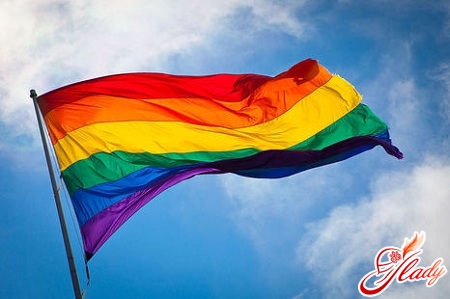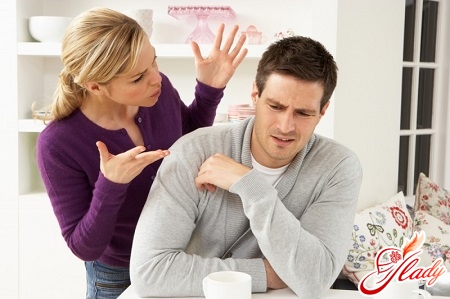 Until the mid-seventies of the last centuryany deviation from the usual norm in sexual relations was considered a mental illness. But in 1975, the American Psychological Association appealed to colleagues from all over the world with a call to remove the stigma of mental illness from people who are characterized by a non-traditional sexual orientation - from lesbians, gays and bisexuals. Psychology deals with the emotional well-being of people, and therefore with what poses a threat to this well-being. American psychologists have proven that prejudice and discrimination against people who consider themselves lesbians, gays and bisexuals have a negative psychological effect not only on each such person, but also on the whole society. Today, adherents of non-traditional sexual relations are not considered mentally ill people, and attitudes towards them have changed dramatically around the world. But attitudes towards them are still not at all unambiguous. What distinguishes these people from everyone else and what is sexual orientation anyway?
Until the mid-seventies of the last centuryany deviation from the usual norm in sexual relations was considered a mental illness. But in 1975, the American Psychological Association appealed to colleagues from all over the world with a call to remove the stigma of mental illness from people who are characterized by a non-traditional sexual orientation - from lesbians, gays and bisexuals. Psychology deals with the emotional well-being of people, and therefore with what poses a threat to this well-being. American psychologists have proven that prejudice and discrimination against people who consider themselves lesbians, gays and bisexuals have a negative psychological effect not only on each such person, but also on the whole society. Today, adherents of non-traditional sexual relations are not considered mentally ill people, and attitudes towards them have changed dramatically around the world. But attitudes towards them are still not at all unambiguous. What distinguishes these people from everyone else and what is sexual orientation anyway?
What is sexual orientation?
Sexual orientation is a strongthe structure of emotional, romantic, and/or sexual attraction to men, women, or both sexes. It also refers to a person's sense of identity, which is associated with behavior and a sense of unity with people who share the same orientation. Sexual orientation is known to range from traditional heterosexual, where there is emotional, romantic, or sexual attraction to the opposite sex, to non-traditional orientation. Non-traditional sexual orientation, in turn, is divided into several types: gay or lesbian (attracted to people of the same sex) and bisexual (attracted to both men and women). This range of behavior has been described in various cultures around the world. Sexual orientation may differ from other components of sex and gender, including biological sex (the anatomical, physiological, and genetic characteristics associated with being male or female), gender identity (the psychological basis for being male or female), and social gender role (the cultural norms that define the boundaries of male and female behavior). Sexual orientation is often perceived as being solely an indicator of a person’s biological sex and an indicator of their gender identity. However, this view is incomplete, since sexual orientation is more of a relational concept. A person expresses their sexual orientation in their interactions with those toward whom their sexuality is directed, and this can be expressed in very simple actions, such as kissing each other or even holding hands. Sexual orientation is thus closely linked to intimate personal relationships that meet a deep-seated need for love, affection, and intimacy. In addition to sexual behavior, personal relationships include not only physical love but also emotional attachment, shared goals and values, mutual support, and commitment to one another. Thus, sexual orientation is not only a personal characteristic of one person. Rather, a particular sexual orientation defines a group of people in which each member of this group is likely to find satisfaction in romantic relationships, which are an important component of personal identity for many people.
How do people find out about their non-traditional orientation?
According to the current resultsAccording to research, the key indicators that form the basis for adult sexual orientation usually emerge between adolescence and early adulthood. These patterns of emotional, romantic, and sexual attraction can arise without prior sexual experience. A person may still be a virgin, but may already know that he or she has a non-traditional sexual orientation, whether lesbian, gay, or bisexual. The same is true, by the way, for heterosexuals. Different people have very different experiences with understanding their sexual orientation. Some know for sure that they are lesbian, gay, or bisexual long before they actually enter into such a relationship. Others enter into sexual relationships before they are aware of their sexual orientation. Society's judgment and unspoken discrimination often make it difficult for many people to come to a definition of their sexual identity, so the realization of a person's non-traditional sexual preferences can be a rather slow process. What makes a person have a particular sexual orientation? What prerequisites can contribute to this? Scientists do not have a unified opinion on the exact reasons that lead to the development of heterosexual, bisexual, lesbian or gay orientations in a person. And although many studies are conducted on this topic, to date, specialists have not found anything that would lead them to the conclusion that sexual orientation can be determined by any specific factor. Many of them believe that nature and upbringing play a large and complex role in the formation of orientation, so a person cannot choose his own sexual orientation at his own discretion - it actually does not depend on him.
What is the psychological impact of discrimination of sexual minorities?
Prejudice and discrimination, whichAlmost all over the world, people of non-traditional orientation are subject to discrimination, have social and personal planes of influence on these people. The influence on lesbians, gays and bisexuals at the social level is reflected even in the everyday stereotype of behavior of people of these groups. Such stereotypes are also preserved by people of traditional orientation in relation to representatives of non-traditional minorities, even if there is no clear evidence of their belonging to gays or lesbians. This, as a rule, is a very unfriendly attitude; such people are significantly limited in their opportunities for employment, raising children and in recognition of their right to create married couples. At the personal level, discrimination can also have negative consequences, especially if gays, lesbians or bisexuals try to hide or deny their sexual orientation. Such psychological burden can have serious negative consequences for health and emotional well-being, becoming a source of constant stress. And if in other cases the support of others can help a person in the fight against stress, then gays, lesbians and bisexuals can hardly count on such support. So, can homosexuality be considered a mental disorder? Experts believe that it is not a mental disorder. Research has shown that there is no internal connection between any of the sexual orientations and psychopathology. Both heterosexual and homosexual behavior are normal aspects of human sexuality. As we have already mentioned, both forms of sexuality have been recorded in different cultures and among different peoples in different historical eras. In addition, such forms of sexual behavior are not uncommon in the animal world.
Are there any methods of returning to traditional orientation?
Let us remind you:back in 1974, homosexuality was excluded from the list of mental illnesses for the first time. This happened in the USA; and in 1990, the example of American psychologists was followed by the World Health Organization, which made the corresponding changes to the International Classification of Diseases. And since non-traditional sexual orientation is not a disease, then there is no reason to treat it. The only thing that psychologists can do for people with non-traditional sexual orientation is to help such individuals effectively cope with social discrimination in society, successfully resolve issues arising in connection with internal conflicts in their social circle and actively lead a happy and satisfying life.
Sexual orientation in adolescence
Adolescence is the period whenребенок пытается психологически отделиться от родителей и семьи и начинает развивать собственную автономию. Этот возраст может стать периодом экспериментов, и многие молодые люди могут испытывать колебания в попытке определиться со своей сексуальной ориентацией. Осознание сексуальных чувств является частью взросления юноши или девушки. Иногда подростки испытывают однополые чувства или переживания, которые смущают их и вызывают путаницу в определении собственной сексуальной ориентации. Такая путаница с течением времени проясняется, у разных молодых людей с различными конечными результатами. Некоторые подростки проявляют интерес к участию в однополых отношениях, и даже проводят некоторые «эксперименты» в этом направлении, но при этом не считают себя геями или лесбиянками. А некоторые продолжают и дальше испытывать влечение только к представителям своего пола, но не проявляют никакую сексуальную активность или же вступают в гетеросексуальные связи в течение какого-то времени. Это происходит из-за их страха перед теми гонениями, которые могут их постигнуть в обществе, где, как правило, царит нетерпимое отношение к такому виду любви. Для некоторых же молодых людей процесс изучения своего влечения к представителям собственного пола в итоге заканчивается тем, что они начинают идентифицировать себя как лесбиянок, геев или бисексуалов. Для части из них признание этого тождества может положить конец путанице с определением собственной сексуальной ориентации. Если они находят понимание и поддержку со стороны своих близких, то их психика практически не подвергается испытанию стрессом. Надо сказать, что чем моложе человек, признающий себя личностью с нетрадиционной ориентацией, тем меньше у него внутренних ресурсов, чтобы отстоять свое право быть именно таким. Таким образом, молодые люди, которые достаточно рано осознают себя «не такими, как все», особенно нуждаются в понимании и поддержке со стороны родителей и других близких людей. Очень часто они сталкиваются с определенными проблемами и переживают негативный опыт, например, избиение или запугивание одноклассниками. Такие переживания могут повлечь за собой весьма отрицательные последствия, такие, как суицидальные мысли, и такие, как незащищенный секс и употребление алкоголя и наркотиков. Именно поэтому для подростка очень важно иметь возможность поговорить о своих запутанных чувствах с кем-то, кому он может полностью довериться, будь то кто-то из родителей, другой член семьи, близкий друг или школьный психолог. Подростку не всегда легко найти кого-то, чтобы поговорить на волнующую его тему. Тем более что он не совсем уверен, что человек, которому он захочет довериться, будет реагировать спокойно и положительно. Порой родители действительно бывают не готовы к такому разговору. В таком случае психологи, врачи или консультанты смогут помочь подростку справиться – конфиденциально и в частном порядке, без информирования остальных членов его окружения – с трудными чувствами, которые вызывает его развивающаяся сексуальность. Эти специалисты могут помочь подросткам найти способы справиться с любым давлением сверстников и с притеснениями и издевательствами, с которыми они могут столкнуться в своей дальнейшей жизни. Они также могут помочь родителям управлять любыми сложными чувствами, которые они, возможно, испытают, узнав о сексуальных взглядах своего подросшего ребенка.
What is the nature of same-sex relationships?
In the West, all sorts of things are often carried outstudies that concern homosexuals. The results of the studies show that many of them have exactly those relationships that seem most attractive to them. For example, the survey data show that from forty to sixty percent of gays and from forty-five to eighty percent of lesbians are in romantic relationships with partners of similar sexual orientation. And the surveys that were conducted in the USA in connection with the population census showed that one couple out of nine who live together but are not married are of the same sex. Stereotypes that have long existed in relation to lesbians and gays are alive in our society today. But many of these stereotypes no longer reflect the actual state of affairs. For example, it seems to people that the relationships of gays and lesbians are inherently dysfunctional and do not bring them happiness. Nevertheless, Western researchers claim that today both same-sex and heterosexual couples are equivalent to each other in the matter of relationships and fulfilling their obligations to each other. Another persistent stereotype is that homosexual relationships are unstable. However, despite social hostility toward same-sex relationships, lesbians and gays form quite stable couples. The same Western studies show that from eighteen to almost thirty percent of homosexual couples have lived together for ten years or more. In addition, many gays and lesbians argue that the ability to have the same legal rights associated with marriage as straight married couples would further enhance the stability of same-sex relationships. A third common misconception is that many people believe that the goals and values of gay and lesbian couples are significantly different from those of heterosexual couples. In fact, the factors that influence the satisfaction of partners in their relationships, as well as the purposefulness and stability of these relationships, are surprisingly similar to those of opposite-sex married couples. However, there has been significantly less research based on the experiences of people who identify as bisexual. If these people are in same-sex relationships, they are likely to face the same issues that lesbians and gays face. If they are in heterosexual relationships, their experiences of partnerships may be very similar to those of people who consider themselves to be committed heterosexuals.
Can gays or lesbians be good parents?
This issue is of particular concern to society now.strongly. Same-sex marriages have become legally recognized in various countries, and people who consider themselves spouses want to raise and educate children. The attitude towards the issue of raising children in same-sex families today is really very acute and ambiguous. Meanwhile, in the United States, for example, thirty-four percent of lesbian women and twenty-two percent of gay men who lead a joint household with their same-sex partners reported during the census that at least one child under the age of eighteen lives with them. But there are also single lesbians and gays who have children, and there are also quite a lot of such parents. The legal status of lesbians and gays has grown significantly in many countries. But many heterosexually oriented members of society express concern about the well-being of children in same-sex families. Most of these questions are based on the negativity that surrounds stereotypes about homosexuals. How can this negativity affect their children? Can children raised by gays and lesbians be at a disadvantage compared to children from heterosexual families? The most common questions people ask and the answers psychologists give are:
- Can children have homosexual parents?to have more problems with their own sexual identity than the children of heterosexual parents? For example, do these children develop problems of gender identity and / or a gender role and the formation of appropriate behavior? The answer of psychologists is this: with regard to lesbian mothers, their children's sexual and gender identity develops in the same way as it does in children from different-sex families. But as for the fathers-gays, the results of the research on them have so far received far too little to be able to draw an unambiguous conclusion.
- Do children, brought up by gays orlesbians, some problems in personal development or in other areas, besides sexual identity? For example, are they not more vulnerable to psychological or nervous breakdown than other children? It is not possible to answer these questions affirmatively, since the differences in mental stability in children from homo- and heterosexual families, if they exist, are only the smallest.
- Can lesbian and gay children have problems inrelationships with others? For example, will they not be teased and will they not be subjected to other ill-treatment by peers? The research data show that such children have normal relationships with peers and adults. The picture, which emerges from such studies, shows that children from same-sex families actively participate in public life within the characteristics of their age group. They are no different from other children in terms of communicating with peers and friends, parents and other family members.
- Is it likely that such childrenwill be sexually abused by parents, friends of parents or their acquaintances? There is no information about the facts of such violence to Western psychologists. Parents, homosexuals or bisexuals relate to the issue of educating their children no less responsibly than parents of ordinary married couples.
Thus, Western psychologists came to the conclusion thatthe conclusion that the concerns that heterosexually minded people have about raising children from same-sex families are often based only on the negative stereotypes that have developed about homosexuals. And in general, children raised by same-sex adults are no different in their psychological well-being from children of heterosexual parents. And yet, questions still remain…
How to reduce discrimination against homosexuals?
People with heterosexual orientation whoIf you are determined to help your gay friends overcome discrimination against them, you should start with yourself first. It is worth reconsidering all your stereotypes in the light of research conducted by Western psychologists and psychiatrists. Research on prejudice, including prejudice against gays and lesbians, consistently shows that the harm to the latter is significantly reduced when members of the majority group (in this case, people of heterosexual orientation) interact with members of the minority group. When a lesbian, gay or bisexual person has the opportunity to freely disclose their sexual orientation, heterosexuals have the opportunity to personally contact a person of non-traditional orientation and perceive him or her primarily as an individual. Homophobia (fear of people of non-traditional orientation) and anti-gay attitudes are much less common among those members of society who have a friend or family member who is gay or lesbian. Sexual orientation includes a complex mixture of biology, psychology and even environmental factors. A certain role can be played by a person's genes and innate hormonal background. It is impossible to choose your sexual orientation - in the vast majority of cases. Therefore, one of the most common stereotypes in relation to homosexuals - the one due to which many consider non-traditional orientation to be ordinary promiscuity and a desire for debauchery - should not form the basis of society's attitude towards such people. You should not base your attitude towards people on another stereotype: many believe that a person's appearance can indicate his sexual inclinations. But a cute and shy, even somewhat effeminate guy is not necessarily gay. And a masculine girl is not necessarily a lesbian. Like most other opinions, when we draw conclusions based only on appearance, such an opinion regarding a person's sexuality may be erroneous. Most likely, today not all the factors that influence a person's sexual orientation have been studied. But there is no doubt that all people, regardless of their orientation, want to feel understood, accepted and respected. It is not always easy, but tolerance is the basis of successful psychological comfort in any society. We recommend reading:









